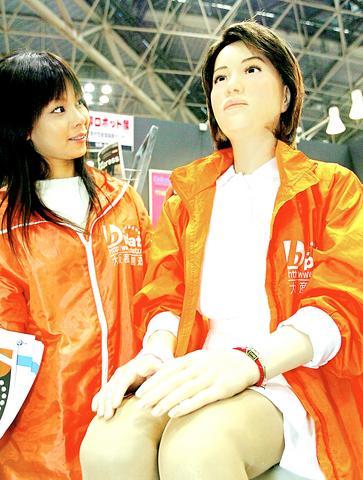Japan's top ink-jet printer maker Seiko Epson Corp unveiled the world's lightest and smallest robot helicopter yesterday, which it hopes will be used as a "flying camera" capable of operating during natural disasters.
The Micro Flying Robot was shown off at the biennial 2003 International Robot Exhibition in Tokyo.
"The robot has a camera and can fly into dangerous areas or areas hit by disasters in place of human beings. In a word, it functions as an eye," said Junji Ajioka, manager of Seiko Epson's strategic business development division.

PHOTO: AFP
"For example, the robot can enter a house flattened by an earthquake and check if anybody is trapped inside," he said.
The prototype four-legged robot weighs just 10 grams and measures 70 millimeters in height. It can be operated by remote control but at present it must be powered via a 1.5-meter-long cable connected to an electric generator.
It took Seiko Epson three years to develop the Micro Flying Robot, Ajioka said while declining to give financial details.
The company hopes the robot will eventually fly independently using an onboard battery but so far has been unable to find a suitably lightweight power source.
"That's why we showed this robot at the exhibition. We want to attract battery makers who can manufacture a very light battery for us," Ajioka said, adding the company had yet to set a date for marketing the robot.
The Tokyo exhibition is held every two years and runs four days from Wednesday with a record 117 corporate participants and 27 organizations.
Most of robots shown at the exhibition are for industrial use but some companies displayed toy robots, including one capable of expressing about 40 emotions.
A small, Tokyo-based company also exhibited Actroid, a sort of robotic mannequin, which is supposed to look like a real-life young woman. Clad in a white shirt and black pants, the "female" robot can bow and move her hands and eyelashes.
The previous exhibition attracted nearly 100,000 visitors, according to the organizers.

Real estate agent and property developer JSL Construction & Development Co (愛山林) led the average compensation rankings among companies listed on the Taiwan Stock Exchange (TWSE) last year, while contract chipmaker Taiwan Semiconductor Manufacturing Co (TSMC, 台積電) finished 14th. JSL Construction paid its employees total average compensation of NT$4.78 million (US$159,701), down 13.5 percent from a year earlier, but still ahead of the most profitable listed tech giants, including TSMC, TWSE data showed. Last year, the average compensation (which includes salary, overtime, bonuses and allowances) paid by TSMC rose 21.6 percent to reach about NT$3.33 million, lifting its ranking by 10 notches

Popular vape brands such as Geek Bar might get more expensive in the US — if you can find them at all. Shipments of vapes from China to the US ground to a near halt last month from a year ago, official data showed, hit by US President Donald Trump’s tariffs and a crackdown on unauthorized e-cigarettes in the world’s biggest market for smoking alternatives. That includes Geek Bar, a brand of flavored vapes that is not authorized to sell in the US, but which had been widely available due to porous import controls. One retailer, who asked not to be named, because

SEASONAL WEAKNESS: The combined revenue of the top 10 foundries fell 5.4%, but rush orders and China’s subsidies partially offset slowing demand Taiwan Semiconductor Manufacturing Co (TSMC, 台積電) further solidified its dominance in the global wafer foundry business in the first quarter of this year, remaining far ahead of its closest rival, Samsung Electronics Co, TrendForce Corp (集邦科技) said yesterday. TSMC posted US$25.52 billion in sales in the January-to-March period, down 5 percent from the previous quarter, but its market share rose from 67.1 percent the previous quarter to 67.6 percent, TrendForce said in a report. While smartphone-related wafer shipments declined in the first quarter due to seasonal factors, solid demand for artificial intelligence (AI) and high-performance computing (HPC) devices and urgent TV-related orders

MINERAL DIPLOMACY: The Chinese commerce ministry said it approved applications for the export of rare earths in a move that could help ease US-China trade tensions Chinese Vice Premier He Lifeng (何立峰) is today to meet a US delegation for talks in the UK, Beijing announced on Saturday amid a fragile truce in the trade dispute between the two powers. He is to visit the UK from yesterday to Friday at the invitation of the British government, the Chinese Ministry of Foreign Affairs said in a statement. He and US representatives are to cochair the first meeting of the US-China economic and trade consultation mechanism, it said. US President Donald Trump on Friday announced that a new round of trade talks with China would start in London beginning today,